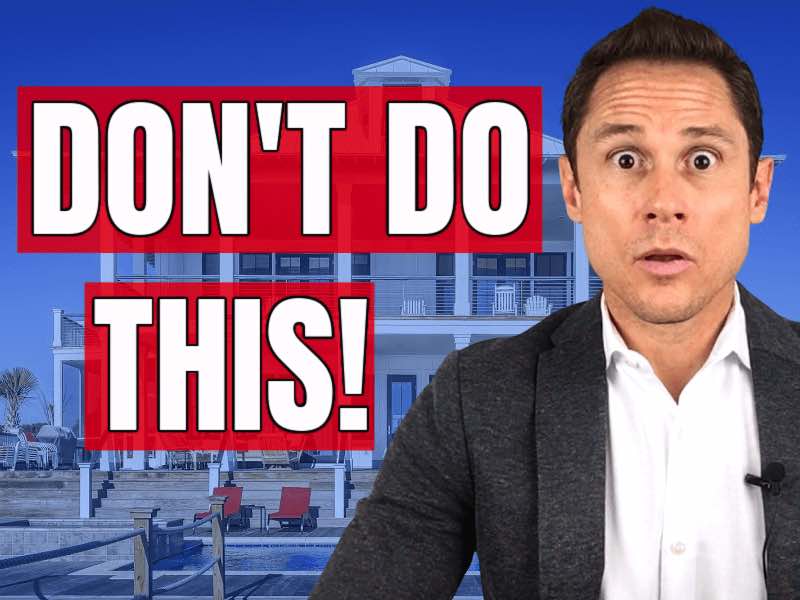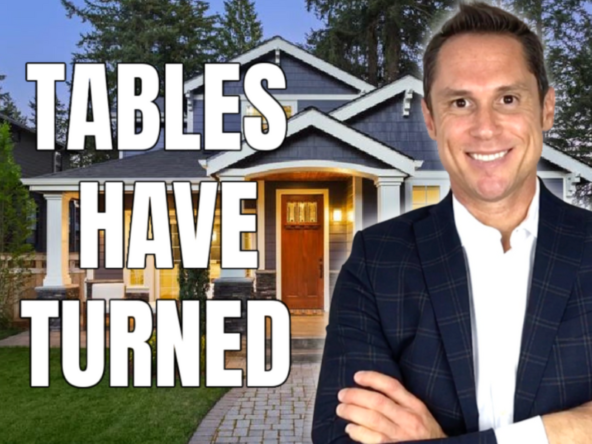It’s surprising how many different things can go wrong when you’re buying a house.
Suppose you’ve shopped for loans, compared interest rates, and got pre-approved by a lender. Now it’s just a matter of picking out the house, agreeing to a price, and moving in. You’re done!
You’re now a homeowner, right?
Unfortunately, not yet!
There are so many things that can happen when buying a house to make the deal go sideways and cause you to lose the home. To avoid that from happening you want to be very cautious until the deed is actually recorded and you’re holding the keys in your hand.
Some of what is to follow might seem like common sense, but unfortunately, common sense isn’t common practice.
With that said, to avoid any stress or aggravation here’s what not to do before buying a house.
1. Don’t Quit or Change Jobs
Obviously, you don’t want to change your job when you’re in the middle of getting a loan for hundreds of thousands of dollars.
Lenders look to minimize their risk at all costs.
It’s less of a risk to them if they can lend money to someone with stable employment as opposed to someone that frequently changes jobs or has just changed employers.
The more consistent your employment is the more financially stable you are. The more financially stable you are the less likely you are to default on your mortgage. A lender’s worst nightmare is when a borrower defaults on their mortgage.
If you’re going to change jobs wait until after you’ve moved into your new home, just to be safe.
2. Don’t Change Banks
Similar to changing jobs, lenders will frown on changing banks when you’re close to purchasing a home. Lenders are looking for consistency in every aspect of your file to ensure lending money to you is a worthy risk.
In general, when you get a pre-approval for a mortgage you have to turn in all supporting documents. Supporting for a mortgage lender would be proof of income, tax returns, and your most recent bank statements.
When someone changes banks out of the blue a lender might delay the process by 30 days or more. If so, you’ll have to provide the most current bank statements in order to do the loan.
If you change banks before buying a house this could turn into quite a debacle.
3. Don’t Miss or Skip Any Payments
It’s imperative you stay current on all your debt payments. This includes credit cards, auto loans, and your current mortgage on your personal residence or rental homes if applicable.
If you have a pre-approval it doesn’t mean you have a loan yet. In fact, the loan transaction isn’t finalized until after it’s been funded and recorded.
Even if you have a pre-approval letter, the lender could check your credit report before funding the loan. If they discover you’ve missed or made any late payments since the last time it was checked it’s highly likely to cause the loan to fall through.
4. Don’t Buy Anything On Credit
It might seem like a good idea to buy new furniture and appliances for your new home. That is, until you discover you might not have a new home to house your new purchases if you do.
Financing anything else before buying a new house is a bad idea, especially big-ticket items. Big purchases can really negatively impact your credit score and your debt-to-income ratio.
Bringing on new debt will affect the state of your credit report and set off alarms for the lender. As a result, it may result in the decline of your loan approval.
Hold off on buying these items before buying a house. The furniture will still be there. However, if you buy this stuff while you’re qualifying for a mortgage your new home might not be.
5. Don’t Buy A Car
You’re on your way to buying your new home, you’re excited, and you feel confident. You might think it would be a nice cherry on top of the home purchase to buy a new car.
The problem with this is if you’re trying to get a mortgage it will increase your debt-to-income ratio. Not to mention, it will lower the amount of monthly income available to pay your new mortgage.
If you bury yourself in a car the bank might determine you can’t afford to buy the home.
If you’re thinking you can simply use cash to buy the car, think again. Any dent in your cash reserves when getting a mortgage will cause problems, which leads us to number six…
6. Don’t Maneuver Money
Don’t make any out-of-the-ordinary withdrawals, deposits, or transfers within 2 months of going into escrow. In fact, refrain from doing so all the way until after the transaction is finalized.
Hold off on pulling money out to make a purchase or transferring $500 from your savings to your checking account. This might sound weird, but don’t even deposit a $5000 monetary gift.
If you make any unusual deposits the lender could suspect it’s from a loan that you’ll need to repay. This could be a problem and might result in you not getting the mortgage.
When you get a pre-approval for a loan, the pre-approval is based on the state of your finances at the time of the application. With that said, keep everything the same until you actually have been given the keys to your new home.
If there’s any movement of money in your accounts it will raise a red flag with the lender. They will then require detailed documentation explaining what’s going on as well as proof that what you’re saying is true.
Lenders prefer to see money, including down payment money, in the same accounts for a minimum of 2 months. In fact, lenders refer to this 2-month period as “seasoning”. They view it as a display of financial stability and an ability to make the mortgage payments.
The bottom line is, do as little as possible to make a lender scrutinize your finances before buying a house. If you need to move any money around wait until after you have the mortgage. Doing otherwise could sabotage the purchase of your home.
7. Don’t Allow Anyone to Check Your Credit
It’s ok to shop for the lowest rate and best mortgage to make sure you’re getting a good deal. However, after you’ve gotten your pre-approval letter don’t apply for new credit.
Abstain from applying for a credit card or any other kind of loan. In addition, don’t apply for a new cell phone service or any other service in general. By doing so they’ll check your credit which will count as a hard inquiry.
Each hard inquiry you get will slightly lower your credit score. If you’re on the borderline of loan approval or locking your interest rate it could cause a lot of harm.
Even more, when a lender notices that you have additional hard inquiries on your credit they may assume you’re trying to take on more debt even if you’re not.
At best, a few inquiries may not cost you your home loan, but why risk it before buying a house?
8. Don’t Co-Sign For Anybody
If your family members or friends ask you to co-sign for them to buy a car or anything for that matter, wait. Hold off until after you have the keys to your new home if you’re going to do it.
When you co-sign for someone you’re essentially guaranteeing the repayment of a loan. Essentially, if the person you’re helping defaults you’ll be responsible and the bank’s going to come looking for you.
As mentioned before, lenders are looking for financial stability. With that said, they’re aware of this risk and will account for your co-signed loan as part of your debt-to-income ratio. This could cost you the loan and ultimately your new home.
Simply wait an extra 30-60 days until you close on your home. Then maybe afterward you might want to consider co-signing for someone if it makes sense.
9. Don’t Consolidate Your Debt Or Close Any Lines Of Credit
It can be very attractive to consolidate all your debt into one payment. In fact, it might even make sense to do it. However, you don’t want to do it right before buying a house or while you’re in the closing process.
The time to do this, if you think you want to, is 3-12 months before you’re planning on buying a home. Before doing so check with your local lender to get their advice. Confirm it makes sense to do in the first place and if so they’ll help ensure it gets done correctly.
Also, many people think that closing their credit cards will help improve their credit, but actually, the opposite is true. Closing your credit cards can lower your credit score because it reduces available credit and increases your credit utilization ratio.
When your credit utilization ratio increases it means you’re using a higher percentage or amount of your available credit. This is a sign of risk to lenders.
In general, you don’t want to close any lines of credit before buying a house. However, if you’re considering doing this consult with your lender to ensure it ultimately won’t affect your loan approval.
10. Avoid Misreporting on Your Loan Application
You might not have any intention of misreporting when you fill out your application. For example, you might not know what to put in a certain section and fill it in with incorrect information.
Anything you report is going to be verified and if you put the wrong information or stretch the truth because you want to make your application more appealing to the lender you’re going to run into an issue.
Be honest when you fill out your loan paperwork.
If you’re ever in doubt about something when you’re completing your loan application pick up the phone and reach out to your lender to avoid ending up in a terrible spot.
11. Don’t Spend More Than You Can Afford
Sometimes home buyers get excited, take on the attitude of all or nothing, and overextend themselves.
If you’re going to be a bear, you might as well be a grizzly, right?!… Wrong!
A lender’s objective is to lend you as much money as you can qualify for on paper.
However, just because you got pre-approved for a certain amount doesn’t necessarily mean you can comfortably make the payment. You have to keep in mind you’ll have to pay for the mortgage, taxes, homeowner’s insurance, and HOA dues if applicable.
Be wise and only use the max pre-approval amount if you can realistically cover the payment, other monthly expenses you need to live, and still set some money aside to save and invest.
12. Avoid Paying More Than the Value of the Home
I know this sounds like a ridiculous thing to say, but in a seller’s market, it’s not unusual for people to pay more than what the home is worth. In fact, it’s normal.
In a seller’s market, there are more buyers than sellers. When there are more buyers than sellers it leads to multiple offers on a home. When there are multiple offers on the same home people compete to buy it and push the price up.
If you’ve been shopping for a while, made several offers, and been outbid every time you might be tempted to do this as well to “win”.
If you end up “winning” a bidding war and are willing to pay more for the home than it appraises for that’s fine. You can do that, but the lender isn’t going to participate in that.
The lender will only lend on what the home is worth. At this point, to get the loan the seller will have to reduce the price, you’ll have to pay the difference in cash, or you’ll have to meet somewhere in the middle.
You might think, “Well, the seller’s just going to have to lower their price!”
If it’s a seller’s market the seller most likely isn’t going to lower their price for you because they’ll have backup offers from other buyers that are ready to go.
What you need to know is if the seller isn’t flexible you’re going to have to come up with the difference in cash if you want to buy the home. If you can’t pay the difference between the agreed-upon price and the appraised value your loan will be denied and you’ll lose the home.
13. Avoid Making Nonsensical Low-Ball Offers
A moment ago you might have been thinking, Mark, don’t worry, I’m in no danger of paying more than a house is worth. I’m planning on low-balling everybody… You definitely don’t want to do that!
Everybody wants a good deal, but you don’t want to cross the line and become a bad buyer by making unreasonable low-ball offers.
If you’ve found your dream house and you really want to buy the home, you don’t want to get cute here and make a ridiculously low offer that isn’t supported by logic.
The seller could get offended and might not even bother to make you a counteroffer. If you cause the seller to ignore your offer because you’re playing games on a house you really want you’ll have essentially shot yourself in the foot and you could kiss the home goodbye.
14. Never Give Your Earnest Money Deposit To A Seller
Your earnest money deposit (EMD) or good faith deposit is applied to closing expenses when you buy a home.
If you haven’t removed any of your contingencies and the transaction doesn’t go through, whether that be because of an appraisal, inspection, or loan problem you’re entitled to a refund of your deposit.
If you gave your deposit funds directly to the seller and they spent it you’re going to have a heck of a time recovering those funds.
Never give your deposit directly to the seller.
Your EMD should go to a neutral third party like an escrow company, title company, or a legal firm so they can safely hold the funds until the sale closes. This should be spelled out in your contract.
15. Don’t Spend Your Closing Costs Funds
Aside from the money you’ve set aside for the down payment if you’re financing, you’re going to have buyer closing costs.
You can typically expect to pay closing costs between 1% to 3% of the home’s purchase price. Depending on the price of the home, discount points, transfer taxes, and other factors this is an approximation.
Your lender will be able to give you an estimate of what your closing costs will be. Whatever that amount is, avoid spending it because you’re going to need it to close escrow.
The last thing you want is to not be able to cover the closing costs when you almost have your new home.
No matter how tight finances may be at the moment, be wise, and don’t touch that money.
If you found this useful, before buying a house check out our Home Buying Checklist. It will help you be fully prepared when you buy your first or next home.
Who else do you know that wants to buy a home within the next 12 months? Share this with them so they’ll be ready as well.





